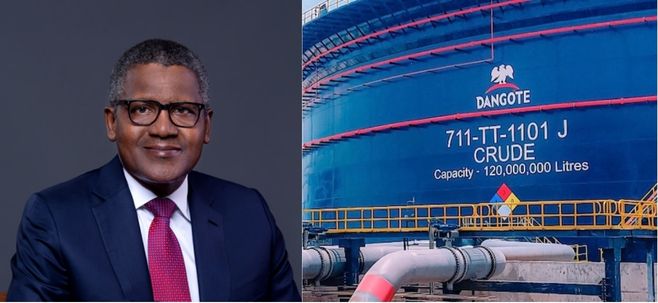A report by Analysts Data Services and Resources (ADSR) Limited has predicted that the Dangote Refinery if operating optimally, will push Nigeria’s economy to $484.15 billion in the next six years.
The multi-billion-dollar refinery, with a capacity of 650,000 barrels per day, is projected to boost Nigeria’s gross domestic product (GDP) growth significantly, reshaping the nation’s economic future.
Join our WhatsApp ChannelDangote Refinery’s Economic Impact
According to the ADSR report, the Dangote Refinery could be a game-changer for Nigeria’s sluggish economy. “Without Dangote Refinery, Nigeria’s GDP growth will be expected to be 3.34% in 2024 and rise to 4.13% in 2030. But with Dangote Refinery, it is projected to record 4.15% in 2024 and rise to 6.21% by 2030,” stated Afolabi Olowookere, Managing Director and Chief Economist at ADSR. He emphasized the potential of the refinery, stating, “The refinery will positively and hugely impact the economy.”
This development comes at a time when Nigeria’s GDP is under threat of decline, with projections from the International Monetary Fund (IMF) showing a dip to $253 billion by the end of 2024. The country, once Africa’s largest economy, could slip to fourth in the rankings due to currency devaluation and other challenges.
However, Olowookere believes that the Dangote Refinery could reverse this trend. “With the refinery reducing imports and generating export potential, we expect improvements in Nigeria’s trade balance,” he explained.
READ ALSO: Why Dangote Refinery Must Not Become Another Monopoly
Dangote Refinery and Nigeria’s Trade Balance
The $20 billion Dangote Refinery, the largest single-train refinery in the world, is expected to improve Nigeria’s foreign exchange position by reducing dependence on imported refined petroleum products. As Nigeria’s domestic refining capacity increases, the trade balance is likely to improve.
“This would contribute positively to GDP growth and economic stability,” the report noted. The potential for the refinery to export surplus refined products will not only reduce Nigeria’s reliance on foreign imports but also bring in much-needed revenue.
Support from Nigeria’s Central Bank
Olayemi Cardoso, Governor of the Central Bank of Nigeria, recently emphasized the critical role of the Dangote Refinery in stabilizing Nigeria’s economy.
“Lifting petroleum products from the Dangote Refinery will ease pressure on the economy and reduce foreign exchange demand,” Cardoso said. He added that this would reduce pressure on the naira and help stabilize the exchange rate, which has been volatile in recent years.
Job Creation and Economic Stability
The ADSR report also highlighted the potential for job creation if the Dangote Refinery becomes fully operational by 2025. It noted that the facility could unlock thousands of employment opportunities, which would, in turn, help reduce Nigeria’s high unemployment rate. The report added that a fully functional refinery could contribute to the overall growth of the nation’s economy.
“Thousands of jobs will be created as the refinery becomes operational, providing relief to the growing number of unemployed Nigerians,” ADSR emphasized in the report. With Nigeria’s unemployment rate currently among the highest in Africa, the refinery is seen as a vital lifeline.
Challenges Ahead for the Dangote Refinery
Despite the optimism surrounding the Dangote Refinery, the ADSR report also flagged some potential challenges. While the refinery is expected to reduce Nigeria’s dependence on imported refined products, several factors may slow its progress. These include capacity limitations, market dynamics, and government policies that may still necessitate continued importation of fuel and even subsidy payments in the short to medium term.
The report further warned that domestic challenges with crude oil production could dampen the refinery’s positive impact. “Battling with crude oil locally to boost production would reduce investors’ confidence and may dampen the projection of the refinery growing Nigeria’s struggling economy,” the report noted.
The Dangote Refinery has the potential to significantly alter Nigeria’s economic trajectory by boosting GDP growth, creating jobs, and stabilizing the currency. However, the extent of its impact will depend on how effectively it can overcome operational challenges and market dynamics. As the refinery nears full operation, its role in Nigeria’s economic recovery will remain under close observation.
Emmanuel Ochayi is a journalist. He is a graduate of the University of Lagos, School of first choice and the nations pride. Emmanuel is keen on exploring writing angles in different areas, including Business, climate change, politics, Education, and others.


















Follow Us